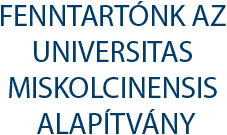UM TO LEAD HUNGARIAN RESEARCHERS IN NANOTECHNOLOGY CONSORTIUM
The University of Miskolc is to be the Hungarian leader in an international consortium aimed at leading to membership of the International Iberian Nanotechnology Laboratory (INL). A memorandum of understanding was signed on 18 February in Miskolc with the aim of establishing the consortium. It was signed by László Palkovics (Minister for Innovation and Technology), Judit Varga (Chairman, Universitas Miskolcinensis Foundation) and Zita Horváth (rector). Also present was Lars Montelius, Director General of INL.
Judit Varga said that the opportunity to bring together and lead a consortium of Hungarian nanotechnology researchers will bring more international attention to UM and increase the university’s competitiveness. She noted that the university’s outstanding research record in materials science means that UM holds an important role in nanotechnology research in Hungary.
Lars Montelius sees collaborations such as this as bringing a new period in nanotechnology research, where it is vital that diverse disciplines cooperate to create knowledge that will lead to development. He pointed out that materials have always been an important part of human progress ¬– we even name ages after them – and with nanotechnology, the work has to begin with very small things, which can have big impacts.
Minister Palkovics spoke about the increasingly intensive government support aimed at fostering Hungarian innovation in the international sphere, and highlighted the role of cooperation among Hungarian universities, research institutes and corporations, but also in international cooperation, which can introduce new practices to Hungary to increase its effectiveness. He added that the government intends to raise the proportion of the GDP spent on research, development and innovation to 3% in the next few years. Compared to 2010, the amount spent on these aims has doubled from HUF 400 billion to 800 billion, while the number of researchers has risen from 31,000 to 62,000 in the same period: this is the largest increase in this indicator of any EU country.
Zita Horváth stressed the importance of this step in strengthening the international role of the university; the rector believes it will lead to an increasing number of international research publications and help UM rise higher in international rankings.



